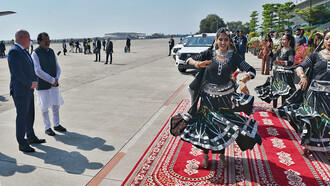The Corona crisis could lead half a billion people into poverty. That is 8 percent of the world's population. This according to a new UN report. COVID-19 risks becoming a major accelerator of poverty.
The report is based on data from the World Bank and presents three different scenarios and their impact on poor households. In all of them, global poverty will increase and the fate of poor people around the world will worsen. This will be the first-time global poverty increases in 30 years. And worse, the researchers say we could face a "poverty tsunami" if the worst-case scenario becomes a reality.
This is deeply disturbing. The global campaign against world poverty has shown great progress over the past decades. Now we risk reversing that. And at a time when we were supposed to deliver on the most ambitious agenda ever, reaching the Sustainable Development Goals (SDGs) by 2030.
Right now, the pandemic is taking a different course in developing countries, some countries being harder hit than others. What is the same across the board, however, is the economic impact. It is severe. And the paradox is that poverty is increasing more as a result of the measures against COVID-19 globally and locally than as a direct result of the pandemic.
To mitigate the effects of the global economic crisis international financial institutions (IFIs) have dug deep into their pockets. Following an agreement between the world's 20 largest economies (G 20), the International Monetary Fund (IMF) announced $100 billion in emergency support to affected countries. In addition, both the IMF and the World Bank have suspended debt servicing for many developing countries.
The World Bank, for its part, announced more than $14 billion in funding for programs in developing countries hit by the crisis. For the next 18 months, ten times more will be made available. While these figures seem high, the support is very far from what is necessary to prevent a serious economic setback for the poor countries. The losses already incurred are many times higher. They also get a smaller share of the cake.
In late April, the IMF announced that $18 billion of their total would go to African countries experiencing a sudden economic crisis due to the impact of the pandemic. If we dig a little deeper and look at the allocation of funds, a clear picture emerges: those who have more get more, while those who have the least get even less. We are seeing a kind of reverse Robin Hood policy.
Let me take some examples. Nigeria in early May received $3.4 billion in support, exactly what it had requested, while Burkina Faso, one of the most affected countries in the region, received only a tiny allocation of $114.3 million, one-third of what they requested.
Burkina Faso is among the poorest countries in the world and hard hit by the combination of Corona and conflict. The country is now subject to attacks by neighboring Islamist extremist movements. 800,000 people are displaced. 2.2 million people are in need of emergency aid. Burkina Faso is in danger of collapsing. The extra burden that the Corona pandemic entails can tip the country over. But their well-justified request was not heeded.
The same applies to Sudan, which is barred from accessing funds from the IMF and the World Bank due to the arrears incurred by the old Islamist regime of President Omar al-Bashir. The Sudan revolution brought a new reform-oriented government to power. It took over an economy in severe crisis. The new government now has to handle the combined impact of escalating numbers of infected and an economy in a downward spiral. But so far, no support.
Unless an exception is provided for the country, and the IMF and the World Bank then unlocks significant funding, the international community risks driving the country into the abyss. Generous support at the donor conference in late June will help, but it will not be enough. The US, the main shareholder in both institutions, will carry a significant responsibility if the Islamists utilize this moment and again take power in Sudan.
And there are other countries too.
It is a paradox that the oil producer Nigeria, always the most affluent on the African continent, is getting a huge capital inflow from the IMF. This is probably due to the fall in the oil price. Because the country had the most, it now loses the most. But why should it get so much more crisis support? It can hardly be macroeconomic policy and good governance that makes Nigeria run away with such a big piece of the cake. That cannot be the reason for the 2,7 bn to Egypt, either, the other major beneficiary on the list. In Nigeria, people are deeply worried that the money the government has received may not be put to good use and disappear in different pockets. People in Egypt have every reason to fear the same. It is of course important to prevent that two of Africa's most populous countries implode, but the danger is not acute.
That large economies are getting more is obvious. But that the poorest and most fragile countries are not getting more assistance is an outright disaster. Corona has become a real poverty accelerator. The support for developing countries should therefore be poverty oriented. If this does not happen, we risk the poverty tsunami the researchers are talking about.
Not only that. There may be serious political implications. We will see more fragile countries than before. And when countries already on the brink of collapse are not supported to weather the storm, the risk of implosion is significant. The international community must change course. More assistance must be provided, and those with less should get more. Not the other way around.















